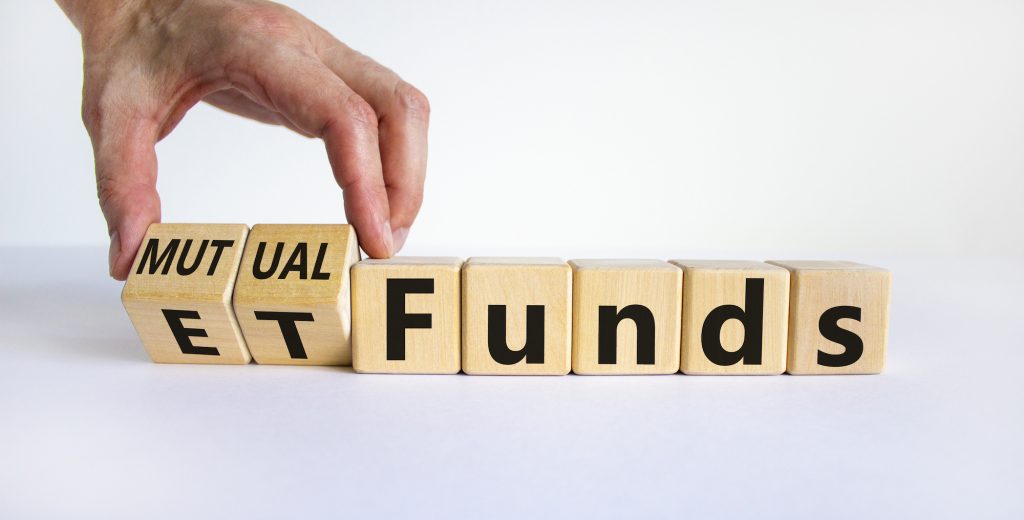You may have heard about mutual funds and exchange-traded funds (ETFs). How do you decide which best fits your investment needs? Both offer many benefits for your portfolio and they have a lot in common, but mutual funds and ETFs have some key differences. The following are the similarities and differences and how to determine which of the two instruments is best for you.
What is a Mutual Fund?
A mutual fund is an investment vehicle that pools money from investors to buy a basket of stocks, bonds, and other securities. This allows you to invest in different companies or bonds at the same time so as to diversify your investments and reduce your risk. Investors buy shares of a mutual fund directly from the company issuing shares or through a broker who purchases shares for investors. Since you buy and hold shares of a mutual fund with the fund company, you cannot move the assets to another financial institution without selling. Mutual funds typically have minimum initial purchase requirements and can be purchased only after the market is closed when their net asset value (NAV) is calculated and set. These funds are generally actively managed by professional money managers so they try to beat their benchmark and may charge high expenses and/or sales commissions.
Advantages of Investing in Mutual Funds:
- able to react quickly to changing market conditions (flexibility)
- a single mutual fund may contain dozens or even hundreds of separate stocks or issuers (diversification)
- mutual funds can be bought and sold once every trading day (liquidity)
- a manager is involved in the funds’ investment selection and management, offering investment advice and providing a simpler, more hands-off experience
- can easily set up automatic investments in fixed amounts
Disadvantages of Investing in Mutual Funds:
- are expensive and often perform only as well as passive automated investments
- management fees tend to be high, eating into your returns.
- may have built-in “loads,” which are essentially sales commissions
- advice is often an additional cost
- the vast majority of actively managed mutual funds fail to outperform benchmarks
- many active mutual funds fail to outperform the market yet you still pay for “active” management
- traded only once per day at the closing NAV price
- most mutual funds are not guaranteed
- the level of risk in a mutual fund depends on what it invests in
What is an Exchange-Traded Fund (ETF)?
An exchange-traded fund (ETF) is an investment vehicle that pools money from investors and uses the funds to buy a basket of stocks, bonds, and other securities. You can buy and sell shares of an ETF just like you would buy shares of a stock from a stock exchange. There are various types of ETFs available to investors that can be used for income generation, speculation, price increases and to hedge or offset risk in an investor’s portfolio.
- Bond ETFs include government bonds, corporate bonds and local or municipal bonds
- Industry ETFs track a particular industry, such as technology, banking or the oil and gas sector
- Commodity ETFs invest in commodities, including crude oil or gold
- Currency ETFs invest in foreign currencies, such as the Euro or the Canadian dollar
- Inverse ETFs attempt to earn gains from stock declines by shorting stocks (selling a stock, expecting a decline in value and repurchasing it at a lower price)
Advantages of ETFs:
- access to many stocks across various industries
- low expense ratios and fewer broker commissions
- risk management through diversification
- ETFs exist that focus on targeted industries
- no investment minimums
- no fees or sales charges
- can trade on an exchange throughout the trading day
- you control the managing of your investments
- usually generate fewer capital gain distributions overall which makes them somewhat more tax-efficient than mutual funds.
Disadvantages of ETFs:
- actively-managed ETFs have higher fees
- single industry focus ETFs limit diversification
- may contribute to market instability
- many ETFs are based on unproven models
Which is right for you?
Understanding the differences between ETFs and mutual funds can help you decide which is best for you and your business.
Use ETFs if:
- Tax efficiency is important: If you’re investing in a taxable brokerage account, having more control over capital gains distributions may be important.
- You’re an active trader: ETFs allow you to set limit orders, stop-limit orders or use margin in your investing strategies as they trade just like stocks.
- You want to gain low-cost exposure to a specific market without researching individual companies: A lot of ETF options benchmark niche market indexes.
- You may change brokers in the future. ETFs are easily transferred between brokers.
Use Mutual Funds if:
- You value the potential to outperform the market through active management.
- You’re investing in less-efficient parts of the market. Actively managed funds have the best potential to outperform in these areas.
- Comparable ETFs are thinly traded.
If you’re not sure whether a mutual fund or ETF is best for you, consider consulting your Chartered Professional Accountant. They understand these products and can offer advice that meets your specific needs.
Need help deciding whether ETFs or mutual funds are right for you? Looking for business advice? Contact Cook and Company Chartered Professional Accountants. We are based out of Calgary, Alberta, serving clients across Canada and the United States. We provide high-quality tax, assurance and succession planning services for a wide variety of privately-owned and managed companies. Contact us for a complimentary consultation.
References:
- https://www.investopedia.com/terms/e/etf.asp
- https://www.investopedia.com/articles/investing/021916/etfs-vs-mutual-funds-which-better-young-investors.asp
- https://www.canadalife.com/blog/investing-saving/etfs-vs-mutual-funds-which-is-right-for-you.html
- https://www.bankrate.com/investing/mutual-fund-vs-etf-which-is-better/
- https://www.securities-administrators.ca/uploadedFiles/General/pdfs/mutual_funds_brochure.pdf
- https://www.wealthsimple.com/en-ca/learn/how-to-invest-in-mutual-funds#should_you_invest_in_mutual_funds



